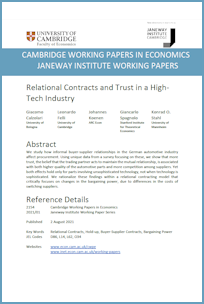
Lloyd, S. P., Marin, E. A.
Capital Controls and Free-Trade Agreements
CWPE2318
Abstract: How does the conduct of optimal cross-border financial policy change with prevailing trade agreements? We study the joint optimal determination of trade policy and capital-flow management in a two-country, two-good model with trade in goods and assets. While the cooperative optimal allocation is efficient and involves no intervention, a country planner acting unilaterally can achieve higher domestic welfare by departing from free trade in addition to levying capital controls. However, time variation in the optimal tariff induces households to over- or under-borrow through its effects on the real exchange rate. In response to fluctuations where incentives for the planner to manipulate the terms of trade inter-and intra-temporally are aligned-e.g., the availability of domestic goods changes, or when faced with trade disruptions to imports-optimal capital controls are larger when used in conjunction with optimal tariffs. In contrast, when the incentives are misaligned, the optimal trade tariff partly substitutes for the use of capital controls. Accounting for strategic interactions, we show that committing to a free-trade agreement can reduce incentives to engage in costly capital-control wars.
Keywords: Capital-Flow Management, Free-Trade Agreements, Ramsey Policy, Tariffs, Trade Policy
JEL Codes: F13 F32 F33 F38
PDF: https://www.econ.cam.ac.uk/research-files/repec/cam/pdf/cwpe2318.pdf 
Open Access Link: https://doi.org/10.17863/CAM.99021
